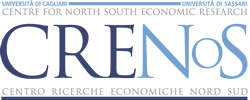Knowledge assets and regional performance
| Title | Knowledge assets and regional performance |
| Publication Type | Working Paper |
| Year of Publication | 2012 |
| Authors | Paci, R, Marrocu, E |
| Number | 2012_13 |
| Keywords | european regions, human capital, innovation, knowledge, production function, spatial spillovers |
| Abstract | Regional competitiveness, especially in the industrialised countries, is increasingly reliant on the availability of an adequate endowment of knowledge assets at the local level, like technological and human capital. These intangible factors enhance regional efficiency directly as inputs of the production function, but they also play a crucial role in allowing the territory to absorb the potential knowledge spillovers from the neighbouring regions. The aim of this paper is to analyse the role of the internal and external factors in determining the productivity level for a large set of regions belonging to the EU27 plus Norway and Switzerland. We estimate a Cobb-Douglas production function over the period 2000-2008 where, in addition to the traditional inputs of physical capital and units of labour, we consider innovation activities and human capital endowments as relevant knowledge assets. We also control for other geographical and industrial features of the regions. In order to take into account the commonly found geographic association across regions, our analysis is carried out within the spatial panel econometric framework. Main results, robust to a wide array of sensitivity checks, show that knowledge assets exhibit positive and significant coefficients and the impact of human capital on GDP is higher than the one found for technological capital in most of the estimated empirical models. Moreover, we find evidence of spatial spillovers directly associated with the two immaterial assets, which turn out to be much more effective in the regions of the 12 new accession countries with respect to all other European regions. The significant presence of such spillovers emphasizes the important role played by highly educated labour forces in increasing the regions’ absorptive capacity of new external knowledge and in ensuring its effective use in the production process. |
| Citation Key | 3613 |
| Attachment | Size |
|---|---|
| 860.99 KB |
